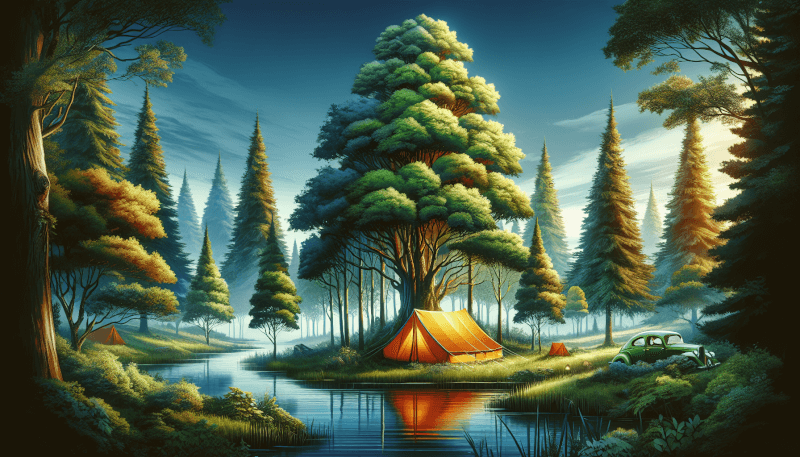If you’re looking to create unforgettable memories with your little ones, planning a camping adventure with kids is the perfect way to do it. Camping offers a unique opportunity for families to reconnect with nature, bond with each other, and experience the thrill of outdoor exploration. But, planning a camping trip with kids can be a bit overwhelming, especially if it’s your first time. That’s why we’ve compiled a list of top tips and tricks to help you navigate through the planning process smoothly and ensure a successful and enjoyable adventure for the whole family. From choosing the right campsite to packing the essentials, we’ve got you covered. So, gear up, grab your tents, and get ready for an incredible camping adventure with your kids!

Choosing the Right Campsite
Consider the location
When choosing a campsite for your family camping adventure, location is key. Look for a campsite that is easily accessible, especially if you have young children. Consider the distance from your home and the travel time it will take to get there. You may also want to consider the scenery and natural surroundings of the campsite. Are there beautiful hiking trails or a nearby lake for swimming? Think about what activities your family enjoys and choose a campsite that offers those options.
Research the facilities
Before settling on a campsite, it’s important to research the facilities available. Make sure the campground has clean restrooms and showers, especially if you are camping with young children. Some campgrounds even have playgrounds or swimming pools which can be a great source of entertainment. Check if there are picnic areas, BBQ pits, or fire pits available for cooking. It is also worth considering if the campsite offers amenities such as electricity hookups or WiFi, depending on your family’s needs and preferences.
Check for family-friendly activities
One of the key aspects of planning a camping adventure with kids is to ensure that there are plenty of family-friendly activities available. Look for a campsite that offers activities such as nature walks, bike rentals, or even organized games and events for children. Some campgrounds even have nature centers or ranger-led programs that can provide educational and interactive experiences for your little ones. Take the time to research and choose a campsite that offers activities that will keep your kids entertained and engaged throughout your camping trip.
Gearing Up for the Trip
Invest in quality camping gear
Investing in quality camping gear is essential for a successful camping adventure with kids. Make sure to purchase a sturdy and spacious tent that can accommodate your entire family comfortably. It’s also a good idea to invest in a quality sleeping bag and camping mattress for each family member to ensure a good night’s sleep. Additionally, consider purchasing camping chairs and a portable camping stove for your cooking needs. Remember, investing in quality gear will not only enhance your camping experience but also ensure the safety and comfort of your family.
Pack appropriate clothing and footwear
When it comes to packing clothing and footwear for your camping trip, it’s important to be prepared for various weather conditions. Pack a combination of lightweight and warm clothing, as temperatures can fluctuate during camping trips. Be sure to bring comfortable and sturdy footwear suitable for hiking and outdoor activities. Pack extra layers and rain gear in case of inclement weather. It’s also a good idea to pack a few extra changes of clothing for your kids, as they tend to get dirty and messy during camping adventures.
Bring essential camping tools and equipment
In addition to camping gear and clothing, it’s important to pack essential camping tools and equipment. Some must-have items include a camping lantern or flashlight for nighttime visibility, a camping stove and cookware for outdoor cooking, and a camping cooler for storing food and drinks. Don’t forget to pack a portable water filter or water purification tablets, as well as a camping knife and multitool for various tasks. It’s always better to be over-prepared than under-prepared, so take the time to make a checklist of all the necessary tools and equipment.

Planning the Meals
Create a meal plan
Planning your meals in advance can save you time and stress during your camping adventure. Consider the duration of your trip and the number of meals you will need to prepare. Make a list of breakfast, lunch, dinner, and snack options, and then create a detailed meal plan. Keep in mind any dietary restrictions or food allergies that your family members may have. Opt for easily-prepared meals that require minimal cooking time and cleanup. It’s also a good idea to pack food that can be stored without refrigeration, such as canned goods, dried fruits, and nuts.
Pack non-perishable snacks
Snacks are an essential part of any camping adventure, especially when you have kids in tow. Pack a variety of non-perishable snacks that are both delicious and nutritious. Granola bars, trail mix, dried fruit, and crackers are all great options. Avoid bringing snacks that are easily crushed or melted, as they may not withstand the rough conditions of a camping trip. Don’t forget to pack plenty of water and reusable water bottles to keep your family hydrated throughout the day.
Involve the kids in meal preparation
Getting your kids involved in meal preparation can make camping meals more enjoyable and memorable. Assign age-appropriate tasks to each child, such as washing vegetables, setting the table, or helping with cooking. Encourage them to help chop ingredients or mix the batter for pancakes. Engaging your kids in meal preparation not only teaches them valuable skills but also creates a sense of ownership and excitement about the meals they will enjoy during the camping trip. It can also be a fun bonding experience for the whole family.
Setting Up Camp
Arrive early to secure a good spot
Arriving early at the campsite is crucial to securing a good spot for your family. Popular campsites can fill up quickly, especially during peak seasons, so it’s important to plan your arrival time accordingly. By arriving early, you’ll have a better chance of selecting a site with the best view, nearby amenities, or a more secluded location if you prefer privacy. Additionally, arriving early allows you to have ample time to set up camp before it gets dark, ensuring that the process is stress-free and enjoyable for everyone.
Designate sleeping areas
When setting up camp, it’s important to designate sleeping areas for each family member. This will help ensure that everyone has their own personal space and can get a good night’s sleep. If you’re using a tent, consider dividing it into sections using sleeping bags or blankets. This will help create separate sleeping areas for parents and kids. If you’re using hammocks or sleeping pads, make sure to allocate enough space for each person. Designating sleeping areas not only provides comfort and privacy but also helps keep everyone organized and accounted for during the camping adventure.
Pitch the tent together
Pitching the tent together can be a fun and educational activity for the whole family. Involve your kids in setting up the tent, teaching them the basics of camping and teamwork. Start by finding a flat and level ground for pitching the tent. Lay out the tent fabric, connect the poles, and secure them according to the manufacturer’s instructions. Encourage your kids to help with hammering the tent stakes and attaching the rainfly. This hands-on experience will not only foster a sense of responsibility but also empower your kids to be active participants in the camping experience.

Organizing Activities
Plan outdoor games and scavenger hunts
Organizing outdoor games and scavenger hunts is a great way to keep your kids entertained and active during your camping adventure. Plan activities such as nature-themed scavenger hunts, sack races, or a friendly game of tag. Bring along a frisbee or a soccer ball for some fun and friendly competition. Encourage your kids to explore the natural surroundings, discover interesting plants or rocks, and learn about the local wildlife. These activities not only provide entertainment but also foster a love and appreciation for nature.
Bring arts and crafts supplies
Arts and crafts activities are a fantastic way to keep your kids engaged and creative during downtime at the campsite. Pack a variety of art supplies such as colored pencils, markers, crayons, and sketchbooks. Encourage your kids to sketch the scenery, create nature-inspired artwork, or make leaf rubbings. You can also bring materials for simple crafts like friendship bracelets or DIY wind chimes. These activities not only stimulate your kids’ imagination but also help them connect with nature in a unique and personal way.
Explore the surrounding nature
One of the most rewarding aspects of camping with kids is the opportunity to explore the surrounding nature together. Take advantage of the natural beauty that surrounds you by going on nature walks or hikes. Teach your kids about local flora and fauna, point out interesting plant and animal species, and encourage them to ask questions. If there’s a body of water nearby, consider swimming, fishing, or simply playing by the shore. Exploring nature together creates lasting memories and instills a sense of wonder and appreciation for our natural world.
Safety First
Teach kids about campfire safety
Campfire safety should be a top priority when camping with kids. Teach your children the importance of fire safety and establish clear rules and boundaries. Show them how to safely build and maintain a campfire, and teach them basic fire extinguishing techniques. Ensure that there is always a responsible adult present whenever a fire is lit. Remind your kids to never leave a fire unattended and to keep a safe distance from the flames. By teaching your kids about campfire safety, you are equipping them with important life skills and ensuring a safe and enjoyable camping experience.
Pack a well-stocked first aid kit
A well-stocked first aid kit is an essential item for any camping adventure, especially when you have kids. Make sure your first aid kit is equipped with all the necessary items, including bandages, antiseptic wipes, pain relievers, tweezers, insect repellent, and any specific medications that your family members may require. Familiarize yourself with the contents of the kit and know how to use each item properly. It’s also a good idea to bring along a basic first aid guidebook for reference. The safety and well-being of your family are of utmost importance, so don’t underestimate the importance of a well-prepared first aid kit.
Establish boundaries and rules
Establishing boundaries and rules is essential for the safety and security of your family during your camping adventure. Set clear guidelines regarding exploring the campsite, swimming in bodies of water, or venturing too far from the campsite without adult supervision. Teach your children what to do in case they get lost or encounter a potentially dangerous situation. Make sure they know the campsite’s emergency contact information and address. By establishing boundaries and rules, you are ensuring the safety of your family and promoting responsible behavior during the camping trip.

Keeping Kids entertained
Bring books and board games
Keeping your kids entertained during downtime at the campsite can be a challenge, but with the right activities, it can be enjoyable for everyone. Bring a selection of books, board games, or card games that are suitable for different ages. Encourage your kids to read under a shade tree or challenge each other to a friendly game of Monopoly or Uno. These activities not only provide entertainment but also promote family bonding and quality time together.
Set up a nature journal
Setting up a nature journal can be a wonderful way for your kids to document their camping adventure and connect with nature on a deeper level. Pack notebooks, colored pencils, and a magnifying glass. Encourage your kids to observe and record interesting animals, plants, or natural phenomena they come across. They can sketch, write descriptions, or even press flowers or leaves as a keepsake. At the end of the camping trip, reflect on the entries together and discuss the things they learned and discovered. Creating a nature journal not only cultivates a love for the outdoors but also develops observation and writing skills.
Have a campfire storytelling night
Nothing beats the cozy ambiance of a campfire storytelling night. Gather around the campfire, roast marshmallows, and take turns sharing stories with your family. Encourage your kids to use their imagination and creativity to create their own stories or reenact their favorite fairy tales. This activity not only sparks creativity but also fosters a love for storytelling and oral tradition. It’s a magical way to end the day and create lasting memories with your kids.
Embracing Nature
Teach kids about local flora and fauna
Camping trips provide an incredible opportunity to teach your children about local flora and fauna. Explore the surrounding nature together and point out different plant and animal species. Teach your kids how to identify trees, flowers, and animal tracks. Discuss their unique characteristics and their role in the ecosystem. You can also bring field guides or use smartphone apps to help identify plants and animals. Encouraging your kids to learn about the local flora and fauna not only enhances their understanding of nature but also helps them develop a sense of stewardship for the environment.
Encourage nature exploration
Encouraging your kids to explore nature during your camping adventure is one of the best ways to cultivate a love for the outdoors. Let them climb trees, splash in puddles, or search for hidden treasures. Encourage them to use their senses to listen to the sounds of birds, smell the fragrance of flowers, and feel the texture of leaves. Point out interesting natural formations or geological features and discuss how they were formed. Allowing your kids to explore nature at their own pace fosters curiosity and a sense of wonder about the world around them.
Try stargazing and identifying constellations
Stargazing is a mesmerizing activity that can be enjoyed by the whole family during your camping trip. Lay out a blanket in an open area away from city lights and look up at the night sky. Encourage your kids to observe the stars and identify different constellations. You can use smartphone apps or stargazing guidebooks to help you navigate the night sky. Teach your kids about the stories and mythology behind these constellations, sparking their interest in astronomy and the wonders of the universe. Stargazing is a peaceful and magical activity that allows your family to connect with the vastness of the universe.

Handling Inclement Weather
Check the weather forecast beforehand
Checking the weather forecast before heading out on your camping adventure is essential, especially when planning outdoor activities. Keep an eye on the forecast for rain, storms, or extreme weather conditions. This will help you prepare accordingly and make any necessary changes to your plans. By staying informed about the weather, you can ensure the safety and comfort of your family and make alternative arrangements if needed.
Bring rain gear and tarps
When camping, it’s always better to be prepared for inclement weather. Pack rain gear such as raincoats, waterproof boots, and umbrellas to keep your family dry during sudden showers. It’s also a good idea to bring extra tarps or a portable canopy to create a covered area for outdoor activities or cooking. Having shelter from the rain will allow your family to continue enjoying the camping experience even in wet weather conditions.
Plan indoor activities for rainy days
Rainy days during a camping trip can be a challenge, but with a little planning, they can still be enjoyable. Pack a selection of indoor activities such as board games, card games, puzzles, or coloring books. Encourage your kids to create their own indoor campsite using blankets and pillows. You can even plan a movie night with a portable DVD player or a laptop. Rainy days provide an opportunity for quality family time, cozy indoor activities, and bonding experiences that are just as memorable as outdoor adventures.
Leave No Trace
Teach kids about Leave No Trace principles
Teaching your kids about Leave No Trace principles is crucial for preserving the natural beauty of campgrounds and ensuring that future generations can also enjoy these outdoor spaces. Teach your children to respect the environment by minimizing their impact on the campsite. Teach them to dispose of waste properly, including picking up trash and packing out everything that is brought in. Encourage them to stay on designated trails and not disturb plants or wildlife. By instilling these principles in your children, you are creating environmentally conscious and responsible individuals.
Pack garbage bags and clean up after yourself
A vital part of leaving no trace is to pack garbage bags and clean up after yourself. Bring plenty of garbage bags and designate an area at the campsite for disposing of waste. Encourage your kids to be responsible for their own trash and teach them how to separate recyclable items. Make it a fun activity by turning it into a game or challenge. By instilling good habits of cleanliness and responsibility, you are setting a positive example for your kids and contributing to the overall cleanliness of the campsite.
Leave the campsite better than you found it
One of the core principles of Leave No Trace is to leave the campsite better than you found it. Encourage your kids to take an extra few minutes before leaving to pick up any trash or litter that they see. Show them how to restore the area to its natural state, such as removing any sticks or rocks used for a campfire. Leave behind a clean and tidy campsite for the next campers to enjoy. By instilling these principles in your children, you are cultivating a lasting respect and appreciation for the environment.
By following these tips and tricks, you can plan a camping adventure that is enjoyable, educational, and memorable for the whole family. From choosing the right campsite to embracing nature and practicing leave no trace principles, every aspect of the trip can be an opportunity to connect with each other and the great outdoors. So grab your camping gear, pack your sense of adventure, and get ready for an unforgettable camping experience with your kids. Happy camping!


